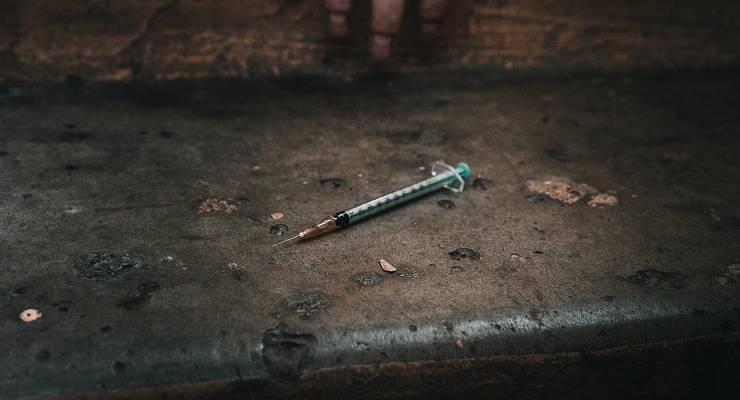
Coronavirus has presented a potential crisis for illicit drug users, drying up supply and pushing people to more desperate measures.
While a shortage of illicit drugs might seem like a good thing, experts warn Australia could see a sharp rise in overdoses, putting pressure on already swamped health systems.
Isn’t a drug shortage a good thing?
A shortage of drugs opens up a “Pandora’s box of problems,” Melinda Lucas, a spokesperson for the Alcohol and Drug Foundation, told Crikey.
“The illicit drug market is not immune to other market force changes we’re seeing. Shortages remain a real concern here … it would have a range of flow-on effects.”
Internationally, countries are already feeling the effect. In the UK, people have started panic buying drugs; Mexican cartels report wholesale price increases for methamphetamine; and in Canada, advocacy groups have pushed for a safe supply of drugs to encourage people to self-isolate instead of purchasing hits off the street.
Home-grown drug processing to increase
While there are suggestions drug cartels will ramp up private plane, yacht and super boat smuggling, Dr Nicole Lee, a professor at the National Drug Research Institute at Curtin University thinks it’s more likely we’ll see more home-grown drug production.
“With air and sea freight restrictions, and shortages on the chemicals used to make drugs, we may see a decline in drug imports. This potentially could have a knock-on effect to increase local manufacture,” she told Crikey.
This doesn’t mean there won’t be shortages, she said. “We’re likely to see supply decrease because of a sudden reduction of imports, and it will take a while for local production to ramp up.”
Price hikes and panic buying
Panic buying hasn’t been limited to toilet paper. Alcohol sales have gone through the roof over the past week as Australians worried whether liquor stores would constitute an essential service during the shutdown.
Professor Michael Farrell, director of the National Drug and Alcohol Research Centre at the University of NSW, told Crikey a similar trend is emerging in the drug market.
“Some people in some networks have been advising people to stockpile,” he said. “This is not a clever strategy for people who have control and substance abuse issues. They won’t stretch it out over the period — the impact is they’re likely to have a substantial increase in how much they use.”
As demand increases and supply decreases, prices are likely to go through the roof, Farrell warned, meaning people may be “more exposed to non-distancing behaviour” as they search for substances.
Withdrawal, relapse and overdose
Supply limitations for prescription pain medication could push people to street opiates, Lee said, as they search for substitutes. “People may seek illicit drug alternatives.”
Lucas said substitution was often linked to overdose. “Someone might switch from one opiate to another, such as from heroin to fentanyl, which is 50 times stronger, risking overdose,” she said.
“For those dependent, if they’re not able to access their drug, they actually go into withdrawal, and that will have a knock-on effect on treatment services, which were already struggling with demand before COVID-19.”
She added that, along with withdrawal and overdose, relapse was a significant concern.
“Addiction is already a disease of isolation and loneliness. People in the early stages of recovery rely on the community — remove that and we find relapse is a lot more common.”
What’s the solution?
Law reform to make accessing drug treatments easier is desperately needed, Lucas said. “We need to look at easing barriers to support services like pharmacotherapies.”
Instead of asking patients to line up daily for a dose of methadone or other opiate treatment, Lucas said innovative treatments should be considered, such as Buvidal, a monthly injection of slow-release opioid treatment.
Farrell said ensuring there were increased supplies of naloxone — used to treat opiate overdoses — was crucial. “We need to move people into less frequent contact and be aware there is a risk of overdose,” he said.
Needle and syringe programs remain an essential service, with experts hoping people will keep using them throughout the pandemic.
Dr Marianne Jauncey, the medical director of Uniting Medically Supervised Injecting Centre in King’s Cross, told Crikey the centre was doing everything it could to keep clients safe.
“This is a really vulnerable group and we are doing all we can to keep the clients and staff free from infection, to stay open as an essential service to people in need.”








Meanwhile those on methadone programs must go along to their supplying pharmacy five days each week as two is the maximum number of takeaways allowed per week. How does that support staying at home? As always, those with addictions are punished.
Not sure alcohol sales have “gone through the roof”. Yes, bottle shop sales of alcohol have increased considerably (I’ve seen one estimate at +40%). But sales in bars and restaurants have declined just a little bit. So total sales of alcohol, including both bottle shops and bars and restaurants, may not have changed that much.
There will be an artificial drought of addictive drugs (heroin and methamphetamine particularly) as higher up suppliers jack up prices, because they can. I doubt there will be genuine shortages of supply for a while – Australia is a *huge* market. Mid level dealers will more heavily cut what they sell, so this may actually make overdoses less likely in many cases: unless of course they cut opiates with fentanyl, which I imagine is still easily available in bulk via the dark net. Addicts (and street-based sex workers) are particularly at risk during these times, and like any capitalist the high-level dealers will be sitting on big stashes, creating an artificial scarcity that provokes desperate behavior/social distancing being ignored. Yet another argument for full decriminalisation.